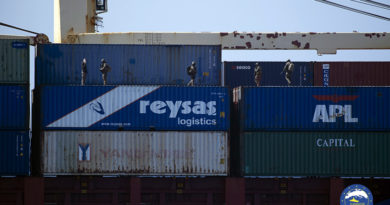On the menu of Defense Ministers on November 16 and 17: Somalia and the Lisbon Treaty
(BRUSSELS2) The 27 EU Defense Ministers are meeting on 16 and 17 November in Brussels, at the same time as their counterparts from Foreign Affairs and Development. On the menu of their discussions, two main subjects: Somalia and the entry into force of the Lisbon Treaty. Sten Tolgfors, the Swedish Minister of Defence, who will chair the meeting sent a small letter to his counterparts to inform them of the program.
Response capabilities
The meeting begins Monday, at 18 p.m., with a "jumbo" session (foreign affairs and defence) with NATO Secretary General Anders Fogh Rasmussen. But most of the work will take place on Tuesday (November 17). The Defense Ministers will start with a meeting in "European Defense Agency" (the Agency's Board of Directors is made up of the 26 Defense Ministers - minus Denmark in derogatory mode - and chaired by the High Representative, Javier Solana). Objective: to define the Agency's 2010 program and its budget (1).Then there will be the (classic) examination of military operations and capabilities.Several reports will thus be examined on the development of both military and civilian ESDP capabilities, as well as the traditional six-monthly report on the ESDP which takes stock and takes stock of the points on the future. A note allowing to reinforce the flexibility of Battlegroups will also be
approved (read Battlegroups more flexible)
Operation(s) Somalia, in the plural?
On the operations side, the surest point is the renewal of the European anti-piracy operation Atalanta with analysis of the one year review of deployment, as well as a discussion on the possible extension of the mandate, on several levels. 1) At the geographical level, the question of out-of-area attacks from Atalanta, south to the Mozambique Channel and, above all, east to the Seychelles could lead to a modification of the OpPlan. 2) At the operational level, as requested by the Spaniards, the inclusion of fishing vessels in the Atalanta objective, and above all the greater use of VPDs or EPEs (protection teams on board vessels) allowing protect all fragile vessels. 3) At the strategic level, a more complex discussion could turn on the strategy to follow: several States, such as Spain and Belgium, plead for a more robust operation, going so far as to block the ports from which the pirates leave. on Spanish initiative (see also: the spanish problems, to follow: the Belgian position).
A decision could be taken regarding a broader operational framework for Somalia. This could start with a training operation for Somali security forces. A final option paper is under discussion in the working groups. But some States are still reluctant and would prefer that this be part of a more global framework. In short, everything is not yet perfectly ready. In the absence of unanimous agreement, the 26/27 could content themselves with reaffirming their intention to launch the operation by approving the concept of crisis management. (Read: Eusec Somalia will aim to train 2000 soldierset The new ESDP mission, "Eusec Somalia", takes shape)
Bosnia and Herzegovina
Concerning the future of the operation in Bosnia and Herzegovina (Althea), and its transformation into a non-executive military operation, of reduced format (200 people), everything is subject to the decision of the Pic (which meets the following day, the November 18). And the discussion will take place more in the afternoon with the Ministers of Foreign Affairs. The latter should consider the evolution of the situation in Serbia and its cooperation with the International Criminal Court. Prosecutor Serge Brametz has given a favorable opinion and the Dutch government - the only country to have vetoed the signing of a stabilization agreement with Belgrade - seems to be changing. If these two obstacles are removed, the way for Serbia's candidacy for the European Union is open. This should have an effect on the neighboring republic of Bosnia and Herzegovina.
Lisbon Treaty
The entry into force of the Lisbon Treaty will of course be at the heart of all discussions, both between Defense Ministers and with Foreign Ministers. It is at this level that the Treaty will have the most implication. Several questions have already been settled such as the future chairmanship of the working groups. But "several other topics remain to be discussed and implemented" indicates Sten Tolgfors, like the permanent enhanced cooperation in particular (2). The essential point - the name of the future High Representative who will chair the Council of Foreign Ministers in the future (after the Spanish Presidency) - will not (officially) But it is certain that some corridor discussions will take place Who knows? and government as High Representative!
Other topics discussed
l'Afghanistan. - and the strengthening of the EUPOL mission as well as the appointment of the government - will also be at the center of the meeting of the Ministers of Foreign Affairs and Development. There Russia will be discussed by Foreign Ministers over dinner on Monday, ahead of the EU-Russia summit to be held on Wednesday (18 November)
(1) The Ministers should thus launch the helicopter training programme, sign the letter of intent for the European air transport fleet, as well as a common cooperation framework for research in the field of security and defence. Two policy statements on "European Military Airworthiness Requirements" and the "Level Playing Field for the European Defense Equipment Market" should also be approved.
(2) read: Permanent structured cooperation: ouuh la la la! It is urgent to wait...
